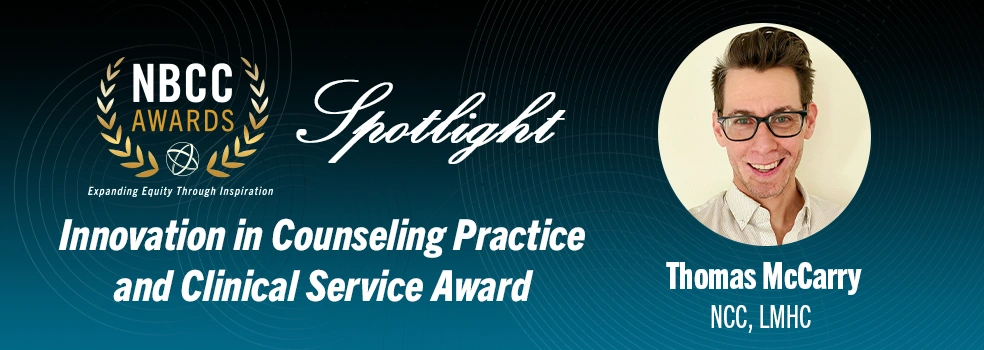
Addiction is a critical public health issue, with more than 100,000 drug overdose deaths in the U.S. in 2023 (Garnett & Miniño, 2024).
Thomas McCarry, NCC, LMHC, realized there weren’t many resources to address overdose prevention, like clinical tools and care pathways. He and his colleague Dr. Virna Little were determined to do something about it.
The colleagues worked at a correctional facility in New York and helped people reenter society. Part of that work included connecting them to opioid treatment and other resources. Unfortunately, sometimes these efforts were unsuccessful and the individuals relapsed and overdosed.
“We felt like there was so much more that could be done,” McCarry says. “We just saw it as people are dying, and we can do better, and we should be doing better.”
They created Zero Overdose in 2018 to reduce unintentional overdoses. McCarry helped develop safety planning resources for individuals who struggle with substance use. He examined evidence-based practices used to support other mental health challenges, like suicide prevention, and adapted them to address overdose prevention.
NBCC is honored to recognize McCarry as the 2025 Innovation in Counseling Practice and Clinical Service Award winner. He received this award for initiating innovative services that improve people’s lives in meaningful ways. His work on Zero Overdose has transformed clinical services and advanced mental health care.
“What [winning the NBCC Award] means to me is acknowledging the work that so many people have been putting their time and effort and passion into,” McCarry says. “I think this is just a great endorsement and recommendation for these practices and clinical tools which are now being implemented across the country.”
McCarry and his team created the Overdose Risk Questionnaire and Safety Plan Template© to support health centers across the country. This safety plan is used by all substance use treatment programs certified by the New York State Office of Addiction Services and Supports.
Additionally, the nonprofit offers Overdose Safety Planning Specialist Training for health care organizations. This training equips helping professionals with skills in screening and managing overdose risks.
Zero Overdose is advancing prevention efforts in more than 36 U.S. states and Puerto Rico. Through partnerships with Certified Community Behavioral Health Clinics, Community Behavioral Health Organizations, and other groups, more people are accessing life-saving overdose prevention resources.
“I've lost friends, family, patients, community members, and public figures who I looked up to for so long to both overdose and suicide. To be part of the solution is really what drives me,” McCarry says.
Zero Overdose also trains first responders, correctional officers, family members of struggling individuals, and high school students. They recognize that prevention efforts are successful when administered in a variety of settings throughout our communities. Effective mental health care starts by meeting people where they are.
In 2022, an average of 224 people died every day from an opioid overdose (Centers for Disease Control and Prevention, 2024). The opioid epidemic requires collaboration among stakeholders for lasting prevention and recovery efforts. Overdoses are preventable, and initiatives like McCarry’s organization ensure that people have the resources they need to thrive.
“The name Zero Overdose is aspirational, but really something that we believe in—in that overdose deaths are preventable,” he shares.
Although Zero Overdose promotes prevention efforts across the United States, its focus is on the individual. Each person requires specialized substance use care based on their unique needs. Zero Overdose leads with compassion and works to eradicate stigma around substance use.
“We have to meet people where they’re at and believe that they have the agency to improve for their goals. That may or may not be abstinence-based,” McCarry explains. “There are many things that we can do to help people along the way.”
McCarry’s work serves as an important reminder that anyone can advance mental health. What started as a small project became an organization with a national impact. McCarry encourages other professionals to take action when they notice pressing issues.
“If you think that something can be done better, it probably can, right? So don't be satisfied with the status quo,” he says.
McCarry invites professionals who are interested in learning more about overdose prevention to connect with Zero Overdose on its website. Hear McCarry talk about his work on NBCC’s 2025 Awards YouTube playlist.
Thomas McCarry, NCC, LMHC, is the co-founder and chief executive officer of Zero Overdose, a nonprofit organization dedicated to preventing substance use overdoses. He is also the director of Substance Abuse Prevention at the Institute for Family Health in New York. He earned his master’s degree in mental health counseling from Ferkauf Graduate School of Psychology and his bachelor’s degree in communication and media studies from Queens University of Charlotte.
Nominations for the 2026 NBCC Awards are open now through Sept. 12, 2025. Don’t miss your opportunity to recognize a deserving colleague, professor, or mentor who is changing lives. Learn more on our website.
References:
Centers for Disease Control and Prevention. (2024, November 1). Understanding the opioid overdose epidemic. https://www.cdc.gov/overdose-prevention/about/understanding-the-opioid-overdose-epidemic.html
Garnett, M. F., & Miniño, A. M. (2024, December). Drug overdose deaths in the United States, 2003–2023. NCHS Data Brief, No. 522.